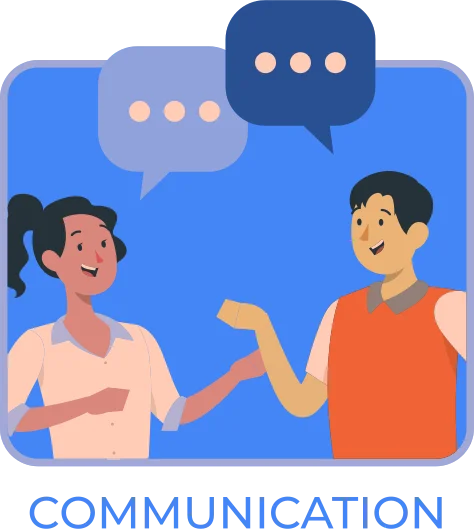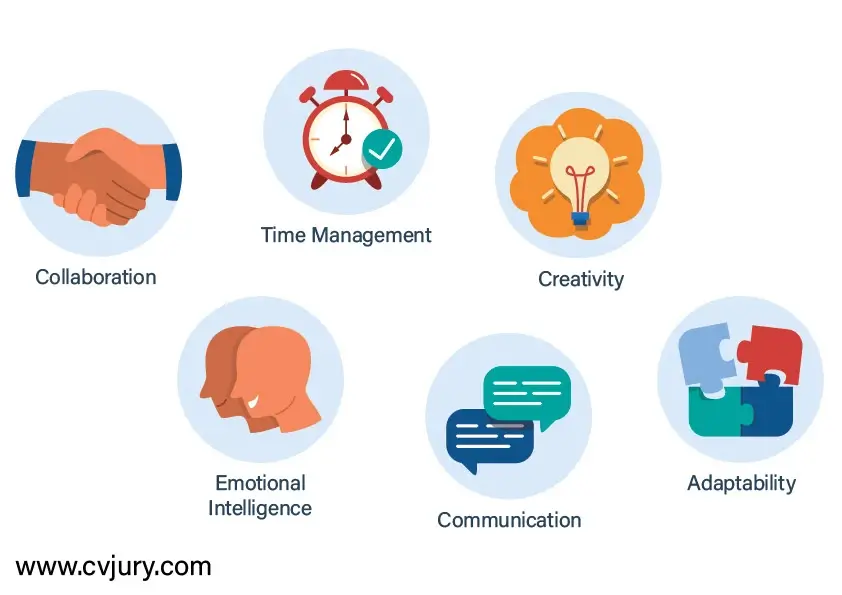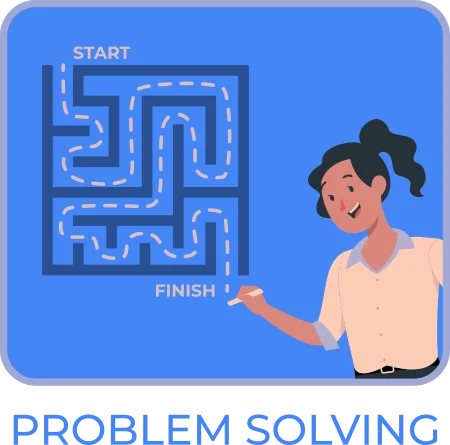Interpersonal skills are crucial to success in life
Those with strong interpersonal skills usually work well in various social situations, including groups.
They communicate well with other people–family, friends, co-workers, and clients.
Having good relationships in the workplace and at home helps them be effective.
You can enhance your interpersonal skills by being more aware of your interactions with others and developing the skills you lack.
This article discusses where interpersonal skills are essential and how you can start to develop them.
Like this post?
Sign up for our blog updates and never miss a post.
We’ll send you A FREE job interview eBook as a thank-you.
What are the skills you need to relate well with other people?
According to some, the term “interpersonal skills” can also refer to interpersonal relationships in general and is sometimes called social skills.
Interpersonal skills refer to how you interact with others.
How do you behave when interacting with others?
How do you treat those you interact with?
Do you encourage impactful relationships among your family, friends, and co-workers?
The answers to those questions tell what interpersonal skills are.
You have to use strong interpersonal skills when relating to others.
Some people’s idea of interpersonal skills is broader than others.
At CVJURY, we define interpersonal skills as the skills you need for effective communication and interaction.
So, they are skills involving interaction with others.
Why Are Interpersonal Skills Important?
They cannot be overemphasized as they enable us to live in society.
During our lives, we encounter and communicate with people daily or even more frequently.
Good social skills ‘grease the wheels’ and help conversations go smoothly and pleasantly for all parties involved.
One tremendous benefit of good interpersonal skills is that they allow us to develop better and more lasting relationships with others.
There’s not a day that goes by without the need to use interpersonal skills.
You need interpersonal skills when interacting with family, friends, coworkers, or customers.
Your interpersonal skills play a significant role in your career success.
Hiring managers at workplaces will look into your interpersonal skills.
You must relate well with your employer, managers, coworkers, and customers.
In addition, you will need to have strong interpersonal skills for your career progression.
Acquiring these skills will help you contribute to your organization’s growth.
Understanding and exemplifying these skills will help you interact with others and contribute to your personal development.
10 Interpersonal Skills
- Communication skills
- Non-verbal communication
- Listening skills
- Emotional intelligence
- Teamwork
- Negotiating, persuading, and influencing skills
- Conflict mediation and resolution
- Problem-solving and decision-making
- Empathy
- Flexibility
Let’s examine one after another.
1. Communication skills
These cover verbal communication and more.
Our daily interactions involve a lot of verbal communication.
When interacting with your family members and friends, you exchange words.
Such words bring you closer to each other.
You exchange words with managers, coworkers, and customers at your workplace.
You have to communicate with people when working on projects.
You must also appreciate them, persuade them, solve problems, and close deals.
All aspects of your interaction with others need verbal communication.
So, what you say and how you say it matter a lot.
Hiring managers will focus more on your communication skills.
They’ll want to determine whether you will best fit the position.
Employers understand that poor communication skills can be detrimental to business growth.
They look for people who can articulate their ideas with power, precision, and humility.
You need to have strong communication skills when talking to your teammates.
That’ll help avoid unnecessary quarrels that could bring division and hatred among workmates.
You also need to have strong communication skills to relate well with customers.
Your words could either help keep customers or drive them away.
Communication skills are also demonstrated in writing.
Content writers need to write to help companies reach more customers.
The blog posts, articles, and adverts they write should help engage more customers.
They should also persuade them to buy their products.
Let’s say a company hires content writers without solid communication skills.
They won’t engage customers, and they’ll drive potential customers away.

Tips for good verbal communication
- Speak in simple language, so most people can understand (e.g., avoid technical jargon).
- Ask questions. This indicates you have an interest in what the speaker is talking about.
- Align your voice with your body language.
- Re-echo what had been said using your paraphrasing and summarising skills.
- Listen attentively.
2. Non-verbal communication
In other words, communication without words includes gestures, diction, and tone of voice.
You can use gestures, facial expressions, posture, tonal variations, and diction.
They’ll all help to communicate a message.
Different non-verbal cues have different interpretations across geographical locations.
Often, non-verbal communication can deliver messages more than verbal communication.
It’s no wonder interviewers look into the non-verbal cues of interviewees.
They can now identify other aspects of behaviors that interviewees have.
Non-verbal communication can create different impressions in various situations.
You can use non-verbal cues when relating to family, friends, coworkers, and customers.
When you smile when you meet your workmates, they will know you value and love working with them.
However, workers can interpret non-verbal cues, leading to strained workmate relationships.
For instance, you can scroll your phone, gaze downwards, or stare sideways.
When your coworkers talk to you, they can interpret that you don’t like them and devalue anything they say.
Customers, too, tend to be sensitive to your non-verbal communication.
Poor non-verbal cues could drive customers away.
Some non-verbal communication can lead to negative impressions.
They include watch-checking, intense eye contact, cracking knuckles, folding arms, and forced laughter.
3. Listening skills
The way we decipher both verbal and non-verbal messages sent and received.
You need to listen to others to decipher their verbal and non-verbal messages.
The best way to show interest in what others tell you is by being a keen listener.
An active listener does not allow any distracting behaviors when listening to others.
When you listen, you prove to others that you value their ideas and are not condescending.
You need to be an active listener to foster good working relationships at the workplace.
Active listening encourages workers to share their thoughts.
They are sure that others are willing to listen to them.
When an organization encourages active listening, problem-solving becomes easy.
Coworkers are quick to detect challenges within the organization.
When someone is listening, they are always ready to offer solutions.
When dealing with customers, employees need to listen.
Listening helps them learn more about the customers.
For example, workers in customer care services listen to customers.
Customers communicate their experiences with the organization’s products or services.
If such workers don’t have strong listening abilities, they might miss a lot from their clients.
Listening to your customers can help diagnose problems you weren’t aware of before.
You will thus solve the problem.
You’ll also encourage customers to continue purchasing your products or services.

7 Techniques for Active Listening
- Be attentive – listen to understand; don’t listen to respond.
- Be ‘present’ –in body and mind. Show the other person your interest in the subject they are discussing.
- Avoid being judgmental.
- Avoid interrupting the speaker or taking over the conversation.
- Give feedback when needed, honestly but courteously.
- Affirm verbally when necessary. Say something like, ‘Yay,’ ‘I see,’ ‘I get it,’ ‘Yeah,’ or ‘Sure thing.’
- Ask open-ended questions when you need clarification
4. Emotional intelligence
It refers to an individual’s ability to identify, understand, and control their and others’ feelings.
Emotional intelligence helps you control different emotions in any given situation.
Emotional intelligence is a crucial skill.
You can always navigate different social situations.
You can do this without negatively affecting others.
The thing is, you will have different experiences.
These experiences will generate different emotions in your life.
If you lack emotional intelligence, bad experiences will affect you.
You’ll also affect those you relate with.
You may experience challenges at home.
For instance, the death of friends or family members, divorce, sickness, and theft.
If you cannot control your emotions, you will go to your workplace and fail to perform your duties well.
You may also end up directing all your frustrations to your managers or workmates.
As a result, you may lead to strained relationships.
Failure to control your emotions can hinder any project you’re working on with others.
Your emotional outburst will make them develop mistrust towards you.
They may even distance themselves, leading to the failure of your project.
Hiring managers will look for individuals with emotional intelligence.
They’ll look for people who can work under pressure.
They need workers who will manage their emotions when interacting with their customers.
Customers don’t care whether you’re facing some difficulties.
All they want is an ideal service, no matter what.
They will ask questions, and they’ll expect you to respond well.
So, how you communicate with them will matter a lot.
If customers realize that you lack emotional stability, they will also develop mistrust.
They’ll look elsewhere for good service delivery.
Customers want service from people who have emotional stability and are considerate.
5. Teamwork
The ability to work well in a group in casual and non-casual scenarios.
This skill is the ability of a team to work together to achieve a common goal.
Teamwork is a significant interpersonal skill in workplaces.
In modern workplaces, teamwork contributes to growth.
Teamwork involves other interpersonal skills.
Communication, listening, emotional intelligence, empathy, and problem-solving contribute to teamwork.
Even if you work alone, you need to collaborate with others to work effectively.
When working, you need to collaborate with your workmates.
You need others when asking for help or offering help.
You need to be available when required to offer help, if possible.
A working environment where people collaborate can realize some growth over time.
But when people fail to work as a team, productivity plummets.
This impacts the growth of a business in a negative way.
Giant companies today emphasize teamwork.
They understand that teamwork is a skill that can help them remain on top of the game.
Manufacturing industries need their workers to collaborate to produce high-quality products.
Businesses emphasize teamwork to disseminate quality services to customers every time.
Effective teamwork can help organizations have an edge over their competitors.
For example, customers will return for more business when they get good service.
Customers will also find the value of their money in the quality of goods and services sold to them.
6. Negotiating, Persuading, and Influencing Skills
People with negotiation, persuasion, and influencing life skills tend to win.
Here, your communication skills play a vital role.
They ensure you can negotiate and persuade people to perform the desired action.
Also, your top-notch negotiation and persuasion skills will help to influence people.
People will often do what you want.
But you should ensure you don’t use your skills to exploit others.
In businesses, hiring managers need workers with strong negotiation, persuasion, and influencing skills.
Such individuals will use their skills to reach out to more potential customers.
These workers will also help to convert more customers.
For example, salespeople need strong negotiation, persuasion, and influencing skills.
Such skills help them reach more customers and convert them.
Salespeople can use these skills to persuade customers to buy and negotiate prices.
Negotiation, persuasion, and influencing skills can also work while solving disputes.
They can also be effective during problem-solving.
A skilled individual can use such skills to bring two parties together to an agreement.
People apply interpersonal communication skills frequently in negotiation or persuasive situations.
In such cases, both parties want to maintain their advantages or improve their position for future transactions.
7. Conflict Mediation and Resolution
Conflict resolution is an interpersonal process that can help people work with one another to resolve disagreements.
Conflicts among individuals often arise.
Conflict is a fact of life, often experienced in relationships and workplaces.
Several factors can contribute to workplace conflict.
Such factors may include work pressure, emotional outbursts, and changes in job positions.
In such circumstances, you need to have strong interpersonal skills.
You will help in conflict mediation and resolution on several occasions.
Other soft skills like negotiation and persuasion will help in solving disputes.
If the conflict remains unsolved, it can lead to negative feelings in an organization.
Conflict can also lead to mistrust between workers and management or employers.
Any rising conflict can affect performance if people work on a project.
However, when conflicts are well resolved, it helps to clear all tension and negative emotions.
As a result, conflict mediation and resolution help restore a friendly working environment.
This leads to the organization’s growth.
8. Problem-Solving and Decision Making
Problem-solving skills and decision-making – identifying, defining, and solving problems with the help of others.
This also includes decisions about what to do when you face a dilemma.
Solving problems and making sound decisions in one’s life can help you live a better life.
Problems are inevitable in life.
You must make the right decisions to escape your many problems.
If you can solve problems well and make good decisions, you can live in any environment.
Employers need workers who are good at solving problems in the business world.
They also need workers who can make good decisions.
They need managers who can detect problems and solve them before they escalate.
Employers also need managers who make the right decisions.
Good decision-making helps improve the growth and development of businesses.
Whether workers face small or big problems, they need to make wise decisions on the way forward.
You can use other interpersonal skills to help you solve problems.
Those skills will also help you make wise decisions.
For example, you can use communication, listening, and emotional intelligence skills.
Setting a framework is the best way to solve minor to significant problems.
A good framework will guide you anytime you want to solve problems.
You also need to rely on logic to make decisions when solving problems.
Relying on emotions or gut feelings can lead you to make wrong decisions.
A simple framework for solving problems
- Define what the problem is and put it as concisely as possible
- Research what experts have said about the problem and the possible solutions
- Decide which solution(s) is most plausible in your judgement
- Execute the solution(s)
- Evaluate the result after a certain period
- Adjust if there’s a need for better outcomes

9. Empathy
Being empathetic means you can identify the feelings of others.
It also means you can understand why they have such feelings.
It is a process of putting oneself in other people’s shoes.
Empathy goes hand in hand with emotional intelligence.
When you have emotional intelligence, you can understand your emotions.
You can also understand the emotions of others.
You understand the emotions of others and empathize with them.
Being empathetic helps you to be compassionate with others.
This comes after understanding their emotional situations.
At workplaces, you need to show empathy to your coworkers.
People experience problems at home or work.
They may be facing challenges in their relationships at home.
They may also be facing difficulties in executing their tasks at the workplace.
You can listen to them and show them that you understand they are experiencing pain.
You can then assist where you can by offering emotional or physical help.
This will create an environment where coworkers can feel comfortable sharing their emotions.
You will encourage an environment where people are compassionate to each other.
You will also cultivate feelings of self-worth.
10. Flexibility
It means one can adapt to changing environments.
Being flexible has been a crucial life skill for survival in humans since the Stone Age.
Those who can respond to changing situations tend to live better lives.
To be flexible, you must learn to adapt to changing circumstances.
That means you also need to rely on other life skills.
Such skills may include emotional intelligence, decision-making, and problem-solving.
In a working environment, workers need to be flexible enough.
Flexibility helps workers to fit into the changing environment.
Businesses today have experienced several changes.
Some of them include technology, remote working, a change in leadership, and unique demands.
Hiring managers will want to know if you are flexible enough to work in any circumstance.
If the business needs restructuring, workers and managers need to adapt.
Flexible workers help to keep the objectives of the business in mind.
They also work towards achieving those objectives.
Interpersonal relationship skills are crucial to succeeding in your career
It is often the case that you have more contact with your co-workers than with your spouse.
You’ll need to interact with and communicate with different people at work, from suppliers and clients to your peers.
The ability to succeed at this activity can positively affect your career in the long term.
In specific careers, strong interpersonal skills can be essential to success.
Customer-facing jobs demand good interpersonal skills to deal with customers or clients daily.
However, there are several other less apparent jobs and careers in which you can use your insights into how people interact with each other.
These include:
Doctors, nurses, and other healthcare practitioners are essential to providing quality healthcare.
One of the essential skills is being able to listen well and being sensitive when giving bad news.
Healthcare professionals often use these skills as second nature, but the consequences can be devastating when they lack proficiency and communication abilities.
Financial advisers must be willing to listen closely to what their customers say (and what they might not express).
They must appreciate how it affects their financial plans as well.
A lack of interpersonal skills means they cannot provide helpful advice or build strong customer relationships.
Computer programming is a professional area we should consider as something other than an occupation just for individuals lacking interpersonal skills.
However, developers will often need more people skills and the ability to understand customers and their needs.

Be more successful at landing a job by improving People skills.
Good people skills are vital to work success, but they are often challenging to demonstrate during the job application process.
Here are some ways people have found that can help, including:
- ‘Naming and claiming’ your skills in a resume or CV is essential to state what you have accomplished clearly.
For example:
“Co-workers often ask me to review their writing before they finally submit it.”
- Focus on individual skills also demonstrated in the job posting/description. When describing them, use the exact keywords and provide specific examples.
Developing interpersonal skills is the foundation for good relationships at work and in social situations.
It is worth spending time developing good people skills.
You have the skills you need to excel in relationships, which have developed since childhood.
It is possible to develop good habits when it comes to interpersonal skills.
However, it is always possible to develop blind spots and not fully understand the reason for a communication or relationship problem.
Closing Thoughts
It’s always imperative to work on improving your interpersonal skills.
Do you want to live well with your family, friends, or workmates?
Interpersonal skills are the prerequisites for good coexistence.
With strong interpersonal skills, you can navigate any life situation.
You can succeed at work and at home.
So, spend enough time working on your interpersonal skills.
Keep working on them even after attaining them.
This is because learning to own strong life skills is a lifetime process.
Keep Reading
To boost your chances of being hired, read the:
- How to write your CV or resume
- Single predictor of success by a fintech billionaire
- How to write a resume like a pro



